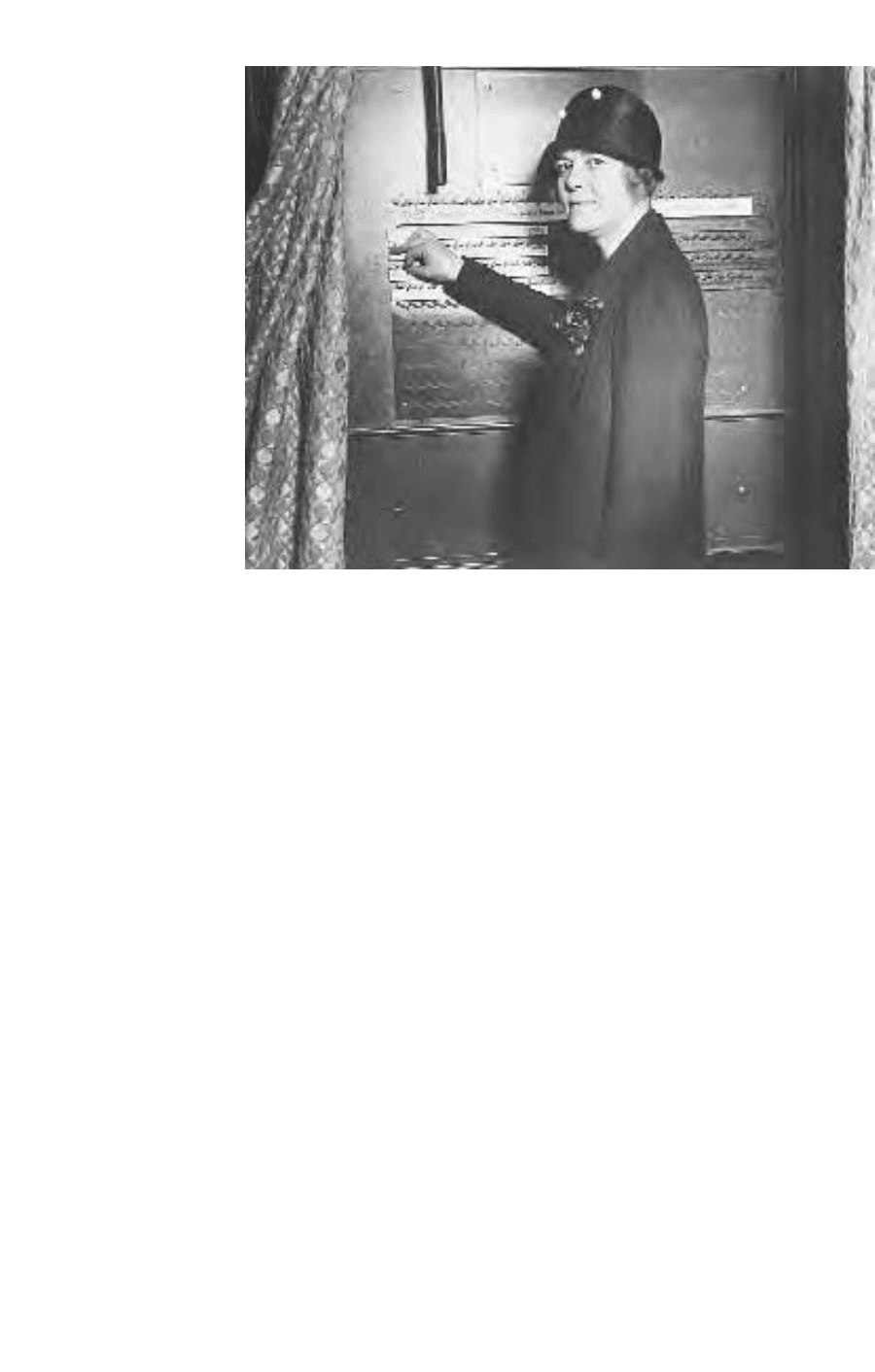Schenken Suzanne O’Dea. From Suffrage to the Senate: An Encyclopedia of American Women in Politics (2 Volumes)
Подождите немного. Документ загружается.


Pornography
In 1985, Andrea Dworkin and Catharine MacKinnon proposed an ordi-
nance that defined pornography as sex discrimination and an infringe-
ment on women’s civil rights. They argue that pornography promotes
misogynist attitudes and behaviors and that it constitutes an evil compa-
rable to racism because both pornography and racism represent one per-
son’s or group’s power over another person or group.
Dworkin and MacKinnon’s antipornography ordinances to protect
women’s liberties, however, clash with First Amendment rights to free
speech. To overcome this obstacle, they point out that pornography resem-
bles other categories of speech that the courts have decided are not protected
under the First Amendment, and some feminists agree with them. Women
Against Pornography was organized to support antipornography ordinances
as women’s route to freedom from harm, pain, and humiliation. The group
contends that pornography degrades women and that a society that tolerates
it also accepts women’s inferiority. The Feminists Against Censorship Task
Force (FACT), in contrast, argues that the antipornography measures pose a
threat to First Amendment rights. FACT also seeks to protect women’s rights
to earn their living as models or stars in pornographic productions.
Minneapolis, Minnesota, adopted versions of the ordinance in 1983
and 1984, but the mayor vetoed it both times. Indianapolis, Indiana, also
adopted a version of it, but the U.S. Supreme Court found it unconstitu-
tional in 1986, saying that the definition of pornography was too broad.
Versions of the measure have been adopted in Western Europe, Australia,
New Zealand, Tasmania, and the Philippines. In 1992, Canada’s Supreme
Court permitted a definition of obscenity that included materials that de-
grade or dehumanize women.
See also Dworkin, Andrea; MacKinnon, Catharine Alice
References Brill, “Freedom, Fantasy, Foes, and Feminism: The Debate around
Pornography” (1990); Cowan, “Pornography: Conflict among Feminists”
(1995).
Poverty
See Feminization of Poverty
Pratt, Eliza Jane (1902–1981)
Democrat Eliza Jane Pratt of North Carolina served in the U.S. House of
Representatives from 25 May 1946 to 3 January 1947. From 1924 to 1946,
Pratt worked as administrative assistant to the members of Congress who
represented the Eighth Congressional District. When the incumbent died
in 1946, she won the special election to fill the vacancy. She concluded that
Pratt, Eliza Jane 539

she could not afford the costs of a campaign for a full term and declined
to run. Between 1947 and 1956, she worked for several federal agencies,
and from 1957 to 1962, she was again secretary to the congressional rep-
resentative for the Eighth Congressional District.
Born in Morven, North Carolina, Pratt attended Queens College in
North Carolina.
See also Congress, Women in
References Office of the Historian, U.S. House of Representatives, Women in
Congress, 1917–1990 (1991).
Pratt, Ruth Sears Baker (1877–1965)
Republican Ruth Pratt of New York served in the U.S. House of Represen-
tatives from 4 March 1929 to 3 March 1933. In Congress, she worked for
appropriations to publish books for the blind, opposed the Eighteenth
Amendment establishing Prohibition, and supported President Herbert
Hoover’s policy to avoid public financing of programs to relieve the un-
employment created by the Depression. She lost her bid for a third term.
Born in Ware, Massachusetts, Pratt attended Wellesley College. A
woman suffrage leader, she was active in Republican Party politics, serv-
ing as a committee vice chair for the Republican National Committee in
1918. In 1925, Pratt became the first female alderman in New York City, a
post she held until 1929, when she ran for Congress. She was Republican
national committeewoman for New York from 1929 to 1943.
540 Pratt, Ruth Sears Baker
Representative Ruth
Pratt (R-NY) demon-
strated how a voting
machine works
during her campaign,
1928 (Corbis/
Bettmann)

See also Congress, Women in; Suffrage
References Office of the Historian, U.S. House of Representatives, Women in
Congress, 1917–1990 (1991).
Pregnancy Discrimination Act of 1978
The Pregnancy Discrimination Act of 1978 amends Title VII of the Civil
Rights Act of 1964 by prohibiting discrimination on the basis of preg-
nancy, childbirth, or related medical conditions. Under the Pregnancy
Discrimination Act, employers are not allowed to refuse to hire a pregnant
woman if she can perform the major tasks of the job. Employers must
treat pregnancy the same as any other temporary disability, which means
they must provide disability benefits and accrued sick leave for hospital-
ization and recovery from childbirth.
The U.S. Supreme Court’s decision in General Electric v. Gilbert
(1976), that pregnancy was a unique condition that did not have to be
treated by employers as an ensured disability and that the exclusion did
not violate Title VII, led women’s rights groups, labor organizations, and
civil rights groups to draft legislation to reverse the decision. Among the
more than fifty organizations involved in lobbying for the bill were the
National Organization for Women, the American Federation of
Labor–Congress of Industrial Organizations, and an antiabortion group.
After introducing the bill in 1977, its supporters argued that dis-
crimination based on pregnancy was a central women’s employment is-
sue. They insisted that employers had used pregnancy as a way to place
women on the margins of the workforce. Supporters believed that the bill
would enhance women’s equal employment opportunities. Opponents of
the bill argued that it would be expensive and that pregnancy was not an
equal employment issue. The Chamber of Commerce of the United States
and the National Association of Manufacturers worried that women
would abuse the system. They insisted that pregnancy was a voluntary
condition and should not be considered a disability.
See also Civil Rights Act of 1964, Title VII; Fourteenth Amendment; Geduldig v.
Aiello; General Electric v. Gilbert
References Congressional Quarterly Almanac, 95th Congress, 1st Session...1977
(1977), Congressional Quarterly Almanac, 95th Congress, 2nd Session...1978
(1979); Geduldig v. Aiello, 417 U.S. 484 (1974); www.eeoc.gov/facts/fs-preg.
html.
President and Vice President, Women Candidates for
More than twenty women have sought the presidency of the United States,
but none of them have won the nomination of the Democratic Party or
the Republican Party. In 1964, Republican senator Margaret Chase Smith
President and Vice President, Women Candidates for 541

was the first woman to run for the nomination of a major party and to se-
cure nomination for president by a major party. Smith ran in primaries in
several states, received twenty-seven votes at the convention, and then with-
drew her name. Congresswoman Shirley Chisholm of New York became
the first African American woman to enter a presidential race when she ran
for the Democratic Party’s nomination in 1972. Chisholm entered twelve
primaries and campaigned across the country in an effort to educate the
public on a wide array of issues. When the party met to choose its candi-
date, Chisholm received 151.25 votes. Congresswoman Patricia Schroeder
of Colorado considered entering the Democratic primaries for president
but abandoned the attempt before entering any primaries. She concluded
that she could not raise enough money to be a serious contender.
In 1952, Charlotta Spears Bass was the first African American woman
to run for vice president when she was the Progressive Party’s candidate.
LaDonna Harris was the Citizens Party’s 1980 vice presidential candidate.
Congresswoman Geraldine Ferraro of New York became the first, and to
date the only, woman to receive a major party’s nomination for vice pres-
ident in 1984, when Democratic Party presidential candidate Walter Mon-
dale named her as his running mate. Twelve years earlier, Gloria Steinem
had orchestrated an effort to place Frances “Sissy” Farenthold’s name in
nomination for vice president on the Democratic Party ticket in 1972.
Farenthold received 400 votes.
In 1872, before women could vote, Victoria Claflin Woodhull ran on
the Equal Rights Party ticket. Lawyer Belva Lockwood followed her in
1884 and 1888 on that party’s ticket. Women have run on other third-
party tickets, including the New Alliance Party, Communist Party, Social-
ist Party, Workers World Party, and Reform Party.
In 1998, a group of women organized the White House Project to
create a climate of opinion that would make voters more amenable to a
woman president by the year 2008.
See also Bass, Charlotta Spears; Chisholm, Shirley Anita St. Hill; Democratic
Party, Women in the; Farenthold, Frances (Sissy) Talton; Ferraro, Geraldine
Anne; Harris, LaDonna; Lockwood, Belva Ann Bennett McNall; Republican
Party, Women in the; Schroeder, Patricia Nell Scott; Smith, Margaret Madeline
Chase; Steinem, Gloria Marie; Woodhull, Victoria Claflin
References Center for the American Woman and Politics, Eagleton Institute of
Politics, Rutgers University.
President’s Commission on the Status of Women
With Executive Order 10980, President John F. Kennedy created the Pres-
ident’s Commission on the Status of Women on 14 December 1961. He
appointed fifteen women and eleven men to serve on the commission,
542 President’s Commission on the Status of Women

which published its report in October 1963. Formed in part to halt con-
gressional passage of the Equal Rights Amendment (ERA), the commis-
sion instead renewed interest in it.
The American Association of University Women and Business and
Professional Women/USA (BPW/USA) had worked for the creation of a
commission since the 1940s but failed to obtain congressional approval
for it. In 1957, the National Manpower Commission at Columbia Univer-
sity recommended that the Department of Labor review state and federal
laws related to women’s employment, but the Women’s Bureau rejected
the idea. The concept gained momentum in 1961 with Esther Peterson’s
appointment to head the Women’s Bureau. With the creation of a com-
mission on the status of women, Peterson saw an opportunity to stop con-
gressional action on the ERA, a measure she opposed because she believed
it would end protective labor legislation for women. Peterson believed
that the more appropriate way to end women’s legal disabilities was
through “specific bills for specific ills” and that a panel to identify legal
barriers confronting women would serve that purpose. Peterson obtained
the support of Eleanor Roosevelt, who in turn discussed it with Kennedy.
The idea appealed to Kennedy, the first president since Herbert Hoover
who did not have a woman in his cabinet, because it provided him with a
program for women.
Kennedy appointed Roosevelt to chair the commission, which in-
cluded U.S. senators Maurine Neuberger and George D. Aiken; Congress-
women Edith Green and Jessica M. Weis; National Council of Negro
Women president Dorothy Height; Margaret Hickey, public affairs editor
for Ladies Home Journal; cabinet members; labor representatives; and oth-
ers. In addition to the commission members, more than 100 people served
on the commission’s committees and consulting groups. Fifty organiza-
tions contributed to the commission’s work, some of them by preparing
papers. Absent from those recruited to serve on the commission or to con-
tribute to the reports were members of the National Woman’s Party, an
organization that had first conceptualized the ERA and had advocated its
passage since 1923. The only commission member who supported the
amendment was Marguerite Rawalt, a former BPW/USA president.
The commission established seven study committees: education and
counseling, home and community services, women in employment, la-
bor standards, security of basic income, women under the law, and
women as citizens. Two additional committees addressed the specific
problems that African American women confronted and the portrayal of
women in the mass media. In its report, the commission made several
recommendations for enhancing women’s status and opportunities. The
educational recommendations included vocational education at all
President’s Commission on the Status of Women 543

levels, continuing education for adult women, and increased guidance
counseling. In the area of home and community, the commission
pointed to the need for child care services and called for fewer restric-
tions on tax deductions for child care and for equal opportunity in em-
ployment. Under labor standards, the commission sought the exten-
sion of the Fair Labor Standards Act of 1938 to categories of employment
not covered, including retail establishments, agriculture, and nonprofit
organizations. Other recommendations included passage of state laws
to establish the principle of equal pay for comparable work and to pro-
tect the right of all workers to join unions of their choice and to bargain
collectively.
In the area of equal rights, the panel suggested three routes for se-
curing them: litigating to test sex discrimination in the courts, filing court
cases arguing that the Fifth and Fourteenth Amendments provided
women with constitutional equality, passing the ERA, and pressing for
state legislative action. The panel preferred court and state action over the
ERA but did not reject it as a possibility. Encouraging women to serve in
elective and appointive offices, the commission said that positions at every
level of government should be filled without regard to sex.
The commission’s last recommendation called for the appointment
of a cabinet officer to direct implementation of the report. On 1 Novem-
ber 1963, President Kennedy issued Executive Order 11126, creating the
Interdepartmental Committee on the Status of Women and the Citizens’
Advisory Council on the Status of Women to ensure the continuation of
the work begun by the commission. Among the other implemented rec-
ommendations were the equalization of civil service health benefits, revi-
sions in the Departments of State and Defense regulations for dependency
allowances, and amendments in the Department of Labor’s eligibility
rules to end sex bias in federal apprenticeship programs.
In 1963, the governor of Washington appointed the first state com-
mission, and by 1967 every state except one had some form of panel on
women’s status. The President’s Commission on the Status of Women and
the state commissions that followed can be credited, at least in part, with
influencing several changes, beginning in the mid-1960s. Three states re-
pealed laws limiting the hours women could work, and eleven states made
them less restrictive; nine states enacted equal pay laws; four states
changed their policies regarding women and jury service; six states en-
acted minimum wage laws that applied to both women and men, and nine
states extended the coverage to men; and three states amended laws that
restricted women’s rights to dispose of their own property. Throughout
the country, state reports created an agenda for change, and panel mem-
bers became advocates for it.
544 President’s Commission on the Status of Women

In 1964, the Citizens’ Advisory Council on the Status of Women and
the Interdepartmental Committee on the Status of Women held the first
of several annual, national conferences of the state commissions. At the
third conference in 1966, a small group of attendees created the Na-
tional Organization for Women, which became a leading advocate for
the ERA.
See also American Association of University Women; Business and Professional
Women/USA; Civil Rights Act of 1964, Title VII; Equal Pay Act of 1963; Equal
Rights Amendment; Executive Order 10980; Executive Order 11126;
Fourteenth Amendment; Green, Edith Louise Starrett; Height, Dorothy Irene;
Juries, Women on; National Association of Commissions for Women; National
Committee to Defeat the UnEqual Rights Amendment; National Council of
Negro Women; National Organization for Women; Neuberger, Maurine
Brown; Peterson, Esther; Protective Legislation; Roosevelt, Eleanor; Weis,
Jessica McCullough; Women’s Bureau
References Harrison, On Account of Sex: The Politics of Women’s Issues,
1945–1968 (1988); Mead and Kaplan, eds., American Women: The Report of the
President’s Commission on the Status of Women and Other Publications of the
Commission (1965).
President’s Interagency Council on Women
Established by President Bill Clinton in 1995, the President’s Interagency
Council on Women seeks to implement the Platform for Action adopted
at the United Nations Fourth World Conference on Women held that year.
Through interagency groups, the council develops policy, organizes
events, promotes dialogue on issues, holds quarterly public briefings and
discussions, and publishes updates on its progress and priorities.
The six working groups focus on women and the global economy,
mentoring, women and prisons, rural women, trafficking in women and
girls, and gender and institutional change, with each group establishing its
own agenda. For example, the agenda for the group on women and the
global economy includes developing a bibliography on the effects of glob-
alization on women and producing an overview of federal government ac-
tivities relating to the global economy and women. The council also spon-
sors events that involve the public, including the Ms. Foundation for
Women’s Take Our Daughters to Work Day.
See also Ms. Foundation for Women
References http://secretary.state.gov/www/iacw/.
President’s Task Force on Women’s Rights and Responsibilities
Established by President Richard Nixon on 1 October 1969, the Presi-
dent’s Task Force on Women’s Rights and Responsibilities was charged
President’s Task Force on Women’s Rights and Responsibilities 545

with reviewing women’s status and making recommendations to advance
women’s opportunities. The task force dissolved on 15 December 1969
after presenting its report.
The task force resulted from the intense lobbying by four Republican
congresswomen, Florence Dwyer of New Jersey, Margaret Heckler of
Massachusetts, Catherine Barnes May of Washington, and Charlotte Reid
of Illinois, who believed that Republicans needed to demonstrate an in-
terest in and concern for women’s issues. Nixon agreed to create the task
force and asked it to collect information for his 1970 State of the Union
Address. The ten women and two men appointed to it detailed discrimi-
nation against women and recommended steps to alleviate it. Nixon, how-
ever, did not mention women in his address.
The task force’s guidelines stated that the report was for the presi-
dent’s information and guidance and that its contents were not to be re-
vealed to the public by the task force. Completed and delivered on 15 De-
cember 1969, it was not released to the public until bootlegged copies
appeared in the Miami Herald and other newspapers in mid-1970. After
Elizabeth Koontz, head of the Women’s Bureau, and several women’s or-
ganizations protested the administration’s continued resistance to making
the report public, it was officially released.
The report, titled “A Matter of Simple Justice,” recommended that
Nixon establish an Office of Women’s Rights and Responsibilities, con-
vene a White House Conference on Women’s Rights and Responsibilities,
and urge passage of the Equal Rights Amendment, a measure he endorsed.
Other recommendations included granting the Equal Employment Op-
portunity Commission enforcement powers, amending the Civil Rights
Act of 1964 to prohibit discrimination on the basis of sex in public ac-
commodations, and expanding the Civil Rights Act of 1957 to grant the
Civil Rights Commission jurisdiction in cases involving denial of rights
because of sex. Examples of recommendations to the executive branch in-
cluded appointing more women to the cabinet and other high-level posi-
tions and directives to federal department heads to establish women’s
units to end discrimination within the departments. A total of twenty-two
recommendations were made in the report.
Few of the recommendations were implemented; however, Nixon ap-
pointed Barbara Hackman Franklin to identify and recruit women to
high-level federal appointments, and Congress passed the Equal Employ-
ment Opportunity Act of 1972 empowering the Equal Employment Op-
portunity Commission to file lawsuits against employers that discrimi-
nated against women.
See also Dwyer, Florence Price; Equal Employment Opportunity Commission;
Franklin, Barbara Hackman; Heckler, Margaret Mary O’Shaughnessy; Koontz,
546 President’s Task Force on Women’s Rights and Responsibilities

Elizabeth Duncan; May Bedell, Catherine Dean Barnes; Reid, Charlotte
Thompson; Women’s Bureau
References Linden-Ward and Green, American Women in the 1960s: Changing
the Future (1993).
Price Waterhouse v. Hopkins (1989)
In Price Waterhouse v. Hopkins, the U.S. Supreme Court decided whether
an employer’s consideration of sex in employment decisions violated Ti-
tle VII of the Civil Rights Act of 1964. Ann Hopkins had worked for the
accounting firm of Price Waterhouse for five years by 1982, when she was
a proposed candidate for partner in the company. At the time, Price Wa-
terhouse had 662 partners, seven of whom were women; that year, of the
eighty-eight candidates for partner, only Hopkins was a woman. The
firm admitted forty-seven new partners, rejected twenty-one candidates,
and held twenty over for recommendation the next year. Hopkins was
among those whose candidacy was held over, but the partners refused
to propose her again. Hopkins sued Price Waterhouse, accusing the
company of sex discrimination under Title VII of the Civil Rights Act
of 1964.
Price Waterhouse partners praised Hopkins’s accomplishments,
character, and professional skills, but in criticism of her interpersonal
skills they also said that she could be abrasive, impatient, and unduly
harsh. Some of the partners reacted negatively to Hopkins’s personality
because she was a woman. One partner described her as macho, another
said that she “overcompensated for being a woman,” and another sug-
gested she take a charm school course. Yet another partner said that she
should learn to “walk more femininely, talk more femininely, dress more
femininely, wear make-up, have her hair styled, and wear jewelry.” Lower
courts concluded that the sex stereotyping and the sex-based evaluations
constituted discrimination based on sex in violation of Title VII. The
courts said that when an employer allowed discrimination to play a role
in an employment decision, it had to prove by clear and convincing evi-
dence that it would have made the same decision if the discrimination had
not been part of the decision.
The U.S. Supreme Court disagreed with the lower courts, saying that
the level of proof (clear and convincing evidence) that the lower courts
had used was too high and that the employer only had to prove that it
would have made the same decision with a preponderance of the evi-
dence. Congress disagreed with the Court, and in the Civil Rights Act of
1991, it prohibited the consideration of race, color, religion, sex, or na-
tional origin in employment decisions, even if the decision would have
been the same without consideration of those factors.
Price Waterhouse v. Hopkins 547

See also Civil Rights Act of 1991; Employment Discrimination
References Price Waterhouse v. Hopkins, 490 U.S. 228 (1989).
Priest, Ivy Maude Baker (1905–1975)
Head of the Women’s Division of the Republican National Committee
(RNC) in 1952 and 1953, Ivy Baker Priest served as treasurer of the United
States from 1953 to 1961. Priest became active in politics in 1932 doing or-
ganizational work for the Young Republicans. After an unsuccessful candi-
dacy for the Utah legislature, she was president of Utah Young Republicans
from 1934 to 1936, Republican cochairperson for eleven western states,
and Republican national committeewoman for Utah from 1944 to 1952.
In 1950, she unsuccessfully ran for Congress, losing to Reva Beck Bosone.
An early supporter of Dwight D. Eisenhower’s presidential candidacy
in 1952, she was the only Utah delegate to the Republican National Con-
vention committed to him. Following his nomination by the Republican
Party that year, Priest was appointed assistant chair of the RNC and head
of the Women’s Division, holding primary responsibility for organizing
women’s support for Eisenhower.
After his election, President Eisenhower appointed Priest treasurer of
the United States, the second woman to hold the position. At the end of
Eisenhower’s second term, Priest moved to California. In 1966, she suc-
cessfully ran for state treasurer, serving from 1967 to 1975.
Born in Kimberly, Utah, Ivy Baker Priest took extension courses at
the University of Utah. She abandoned her studies when her father’s ill
health made it necessary for her to find employment. Priest worked as a
telephone operator, sales clerk, and department store buyer. Her autobi-
ography, Green Grows Ivy, was published in 1958.
See also Bosone, Reva Zilpha Beck; Clark Gray, Georgia Neese; Republican
Party, Women in the
References Layton, “Ivy Baker Priest” (1996); New York Times, 25 June 1975.
Progressive Party, Women in the
Before women had voting rights, women reformers worked for and with
Progressive Party candidates at the local, state, and national levels. When
the Progressive Party organized on the national level in 1912, women held
seats on its national committee, recognition that Democrats did not give
their female members until 1920 and Republicans until 1924. Women del-
egates to the 1912 Progressive Party convention helped write the party
platform, which included support for woman suffrage, minimum wage
insurance, child labor reform, and old age insurance, all priorities of
women reformers. Women joined Bull Moose Clubs to work for Theodore
548 Priest, Ivy Maude Baker
